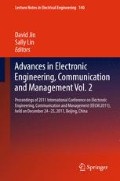Abstract
The existing reconstruction algorithms are mainly implemented based on the known sparsity of original signal. In this paper, a new algorithm called blind adaptive matching pursuit (BAMP) is proposed in this paper, which can recover the original signal fast in the case of unknown sparsity based on the divide and conquer method. Firstly, the range of sparsity is determined by trial and error test. Secondly, the efficient support set is screened out rapidly by adaptive grouping and support extension. Last but not least, reconstructed signal is obtained by pruning. The results of simulation show that the new algorithm can reconstruct signal faster and get better precision than other similar algorithms in the same conditions.
Access this chapter
Tax calculation will be finalised at checkout
Purchases are for personal use only
Preview
Unable to display preview. Download preview PDF.
References
Baraniuk, R.G.: Compressive Sensing. IEEE Signal Processing Magazine 24, 118–121 (2007)
Donoho, D.L.: Compressed sensing. IEEE Trans. on Information Theory 52, 1289–1306 (2006)
Donoho, D.L., Tsaig, Y.: Extensions of compressed sensing. Signal Process. 86, 533–548 (2006)
Guangming, S., Danhua, L., Dahua, G., Zhe, L., Jie, L., Liangjun, W.: Advances in Theory and Application of Compressed Sensing (in Chinese). Acta Electronica Sinica 37, 1070–1081 (2009)
Do, T.T., Gan, L., Nguyen, N.S.: Sparsity adaptive matching pursuit algorithm for practical compressed sensing. In: Asilomar Conference on Signals, Systems and Computers (2008)
Needell, D., Tropp, J.A.: CoSaMP: Iterative Signal Recovery from Incomplete and Inaccurate Samples. Commun. ACM 53, 93–100 (2010)
Chen, S.S., Donoho, D.L., Saunders, M.A.: Atomic Decomposition by Basis Pursuit. SIAM J. Sci. Comput. 20, 33–61 (1998)
Mallat, S., Zhang, Z.: Matching pursuits with time-frequency dictionaries. IEEE Trans. on Signal Processing 41, 3397–3415 (1993)
Tropp, J.A., Gilbert, A.C.: Signal recovery from random measurements via orthogonal matching pursuit. IEEE T. Inform. Theory 53, 4655–4666 (2007)
Donoho, D.L., Tsaig, Y., Drori, I., Starck, J.: Sparse solution of underdetermined linear equations by stagewise orthogonal matching pursuit (2006)
Blumensath, T., Davies, M.E.: Iterative thresholding for sparse approximation. Fourier Anal. 14, 629–654 (2008)
Gilbert, A., Strauss, M., Tropp, J., Vershynin, R.: Algorithmic linear dimension reduction in the l 1 norm for sparse vectors, http://www.math.ucdavis.edu/~vershynin/papers/algorithmic-dim-reduction.pdf
Gilbert, A.C., Strauss, M.J., Trop, J.A., Al, E.: One sketch for all: Fast algorithms for compressed sensing. In: Proceedings of the 39th Annual ACM Symposium on Theory of Computing, pp. 237–246. Association for Computing Machiner (2007)
Zongnian, Z., Rentai, H., Jingwen, Y.: A Blind Sparsity Reconstruction Algorithm for Compressed Sensing Signal (in Chinese). Acta Electronica Sinica 39, 18–22 (2011)
Yaxin, L., Ruizhen, Z., Shaohai, H., Chunhui, J.: Regularized Adaptive Matching Pursuit Algorithm for Signal Reconstruction Based on Compressive Sensing (in Chinese). Journal of Electronics & Information Technology 32, 2713–2717 (2010)
Author information
Authors and Affiliations
Editor information
Editors and Affiliations
Rights and permissions
Copyright information
© 2012 Springer Berlin Heidelberg
About this paper
Cite this paper
Tian, W., Rui, G., Fu, Z. (2012). A Blind Adaptive Matching Pursuit Algorithm for Compressed Sensing Based on Divide and Conquer. In: Jin, D., Lin, S. (eds) Advances in Electronic Engineering, Communication and Management Vol.2. Lecture Notes in Electrical Engineering, vol 140. Springer, Berlin, Heidelberg. https://doi.org/10.1007/978-3-642-27296-7_2
Download citation
DOI: https://doi.org/10.1007/978-3-642-27296-7_2
Publisher Name: Springer, Berlin, Heidelberg
Print ISBN: 978-3-642-27295-0
Online ISBN: 978-3-642-27296-7
eBook Packages: EngineeringEngineering (R0)

